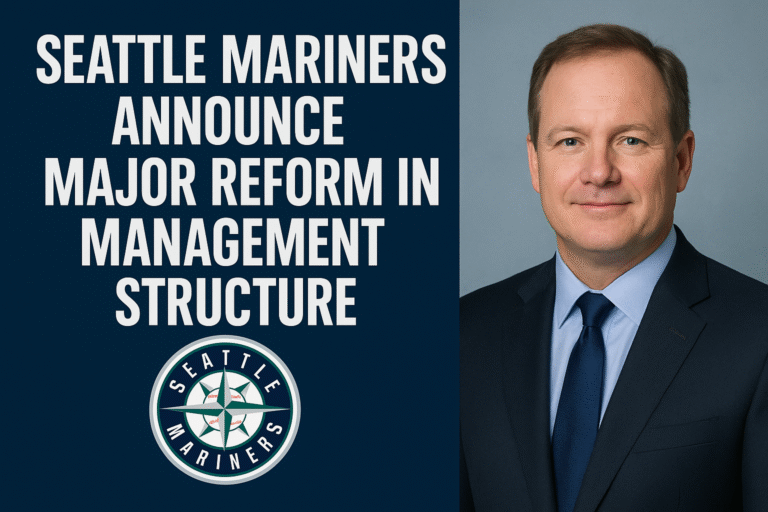Seattle Mariners Announce Major Reform in Management Structure
In a significant shake-up aimed at revitalizing the franchise’s competitive edge, the Seattle Mariners have officially announced a sweeping reform in their management structure. The move, unveiled on Friday morning, marks a new chapter for the organization as it seeks to build on recent progress while addressing long-standing challenges both on and off the field.
According to the team’s official statement, the reforms will involve a reorganization of the front-office hierarchy, the introduction of new leadership roles, and an enhanced focus on analytics-driven decision-making. Mariners Chairman and CEO John Stanton described the restructuring as a “strategic evolution” designed to position the team for sustained success.
“Our goal is to create a more dynamic, forward-thinking management culture,” Stanton said. “We’ve made great strides in recent years, but we recognize that to compete consistently at the highest level, we must innovate not just on the field but throughout our entire organization.”
Key Changes in the Front Office
At the heart of the reform is a reshuffling of senior management roles. General Manager Justin Hollander will now oversee baseball operations with expanded authority, while Jerry Dipoto, who previously served as President of Baseball Operations, is transitioning into a broader strategic role focused on long-term organizational planning and talent development.
The team also announced the creation of a Vice President of Player Development and Performance position, which will integrate scouting, player analytics, and sports science into a unified department. This new role is expected to bridge the gap between the Mariners’ major league club and their minor league affiliates, fostering a more cohesive development pipeline.
Additionally, the organization is bolstering its data and analytics department. Several new hires are expected to join from both professional baseball and the tech industry — a reflection of Seattle’s ambition to blend innovation with athletic expertise. Insiders say this expansion signals the Mariners’ intent to become one of the most analytically advanced franchises in Major League Baseball.
A Culture Shift in the Making
Beyond structural changes, the reform is also about culture. Reports suggest that the Mariners’ leadership wants to cultivate a more transparent and collaborative environment — one where communication flows more freely between departments, from scouting to coaching to player support.
The franchise has faced criticism in the past for inconsistency in player development and communication gaps between management and on-field staff. The new approach is designed to remedy those issues, ensuring that strategic decisions are more data-informed and that everyone — from the clubhouse to the front office — is aligned under a unified vision.
Manager Scott Servais expressed optimism about the changes, emphasizing how clearer communication channels and a renewed sense of purpose could benefit the team.
“This organization has always had talent, both in our players and our staff,” Servais said. “What these reforms do is make sure we’re all pulling in the same direction. It’s about accountability, innovation, and shared goals.”
Looking Toward the Future
The Mariners’ decision comes at a critical juncture. Despite flashes of brilliance in recent seasons, the team has struggled to secure consistent postseason appearances, a frustration for fans eager to see Seattle return to October baseball glory. The management overhaul signals a commitment not just to short-term competitiveness but to building a sustainable, championship-caliber organization.
Industry analysts have largely praised the move, noting that such reforms mirror trends seen in other successful MLB franchises that have blended traditional baseball acumen with cutting-edge analytics. If executed effectively, the Mariners’ new model could make them a blueprint for modern team management.
While it remains to be seen how quickly the effects of these changes will manifest on the field, the message from the top is clear: the Seattle Mariners are embracing transformation. The organization’s leadership believes that a refreshed management framework, backed by innovation and collaboration, can finally unlock the team’s full potential.
As the 2026 season approaches, all eyes will be on how these reforms translate into results. For Mariners fans, the hope is that this bold restructuring marks the beginning of a new era — one where Seattle not only competes but thrives among baseball’s elite.
